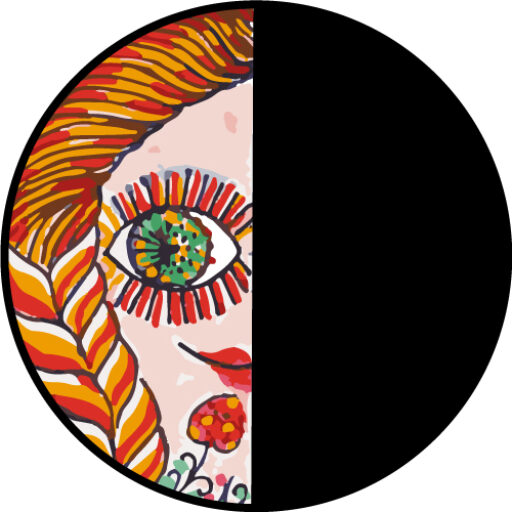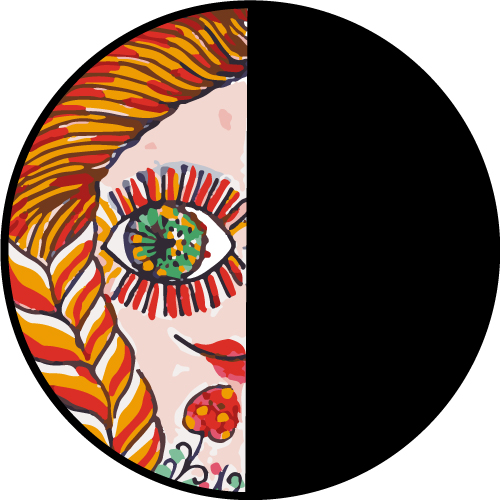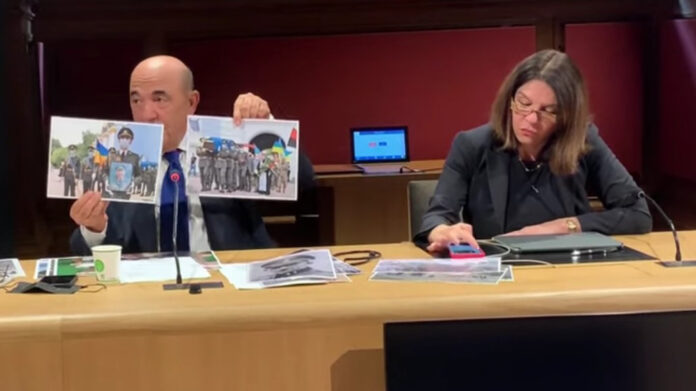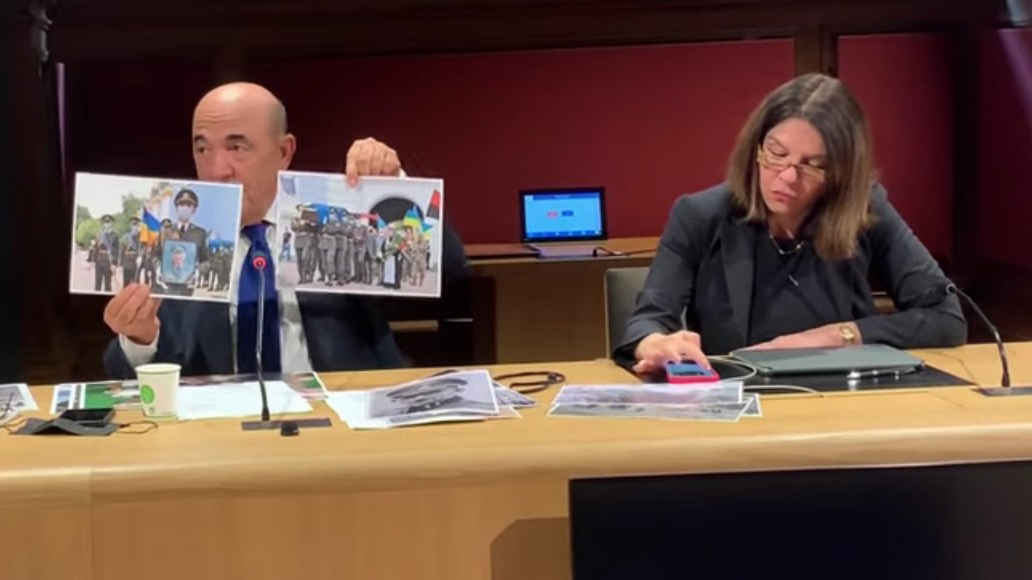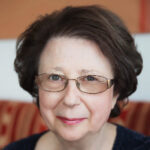On June 21, in the Senate, Senator Nathalie Goulet organized a “press briefing” with Vadim Rabinovich, a Ukrainian press magnate and leader of the pro-Russian party “Opposition Platform For Life”, and Marek Halter as a guest of honor. They were going to discuss both “Anti-Semitism in Ukraine” and “How to commemorate 80 years of the Babi Yar massacre”. But is Vadim Rabinovich a legitimate interlocutor?
If Marek Halter was there, Noémie Nadar, president of the Union of Jewish Students of France (UEJF), although posted, did not come. As for the possibility of registering for this session, everything depended on the goodwill of the senator. Alla Lazareva, correspondent of the Ukrainian weekly magazine Tyzhden, was refused. As for the co-author of this text, the senator promised to send her a link the day before (as indicated on the invitation) and even to give her the opportunity to interview participants on the phone, before and after the meeting, but nothing of the sort happened. Likewise, the Ukrainian Embassy’s request went unanswered (one advisor had to ask for help from another senator to enter the otherwise nearly empty room). The meeting, announced to last 2 hours (10am-12pm), was reduced to a 35-minute “press briefing”.
Nathalie Goulet, a centrist, happens to have a long relationship with Vadim Rabinovich – she declared it herself at the beginning of this press briefing. At the end of May, she went to Ukraine, all expenses paid, as a guest of the pro-Russian oligarch and media mogul Viktor Medvedchuk, who is an old friend of Putin (the latter is even the godfather of his daughter Dacha). This visit, where Mrs. Goulet was accompanied by two other centrist senators, Joël Guerriau and Jean-Pierre Moga, had as its primary objective to meet with Vadim Rabinovich, Medvedchuk’s right-hand man, who is currently accused by the Ukrainian security services of “high treason”, for having passed on confidential information to the Russians, and of “attempting to plunder the resources of occupied Crimea”. Nathalie Goulet has been cultivating contacts with Rabinovich since 2015: on her invitation, he has come several times to the Luxembourg Palace, where he is, according to her, “always welcome.”
Since the relationship between Ms. Goulet and Mr. Rabinovich is long-standing, perhaps she should have inquired about the real background of this “friend” and “deputy-rabbi” (as she introduced him during the press briefing). She could have known, in particular, that the man who is presented on the above poster as “the president of the Jewish community of Ukraine” is simply a fraud. During his brief speech in the Senate (which we were able to follow on Senator Goulet’s Twitter account), Mr. Rabinovich introduced himself even more pompously: “president for 25 years of the Jewish community of Ukraine” and “president of the Jewish European Parliament” in Brussels.
However, there is no unique organization of Jewish community in Ukraine that speaks with one voice and has elective bodies. Ukrainian Jews have formed a multitude of structures and associations of religion, mutual aid, culture, survivors of ghettos and Nazi camps, etc., many of which, more than 250, are part of the Vaad (council) of Ukraine, akin to the CRIF in France. But Mr. Rabinovich is not a member of the Vaad. Another organization that unites a significant number of Jewish associations in Ukraine, about 140, is the United Jewish Community of Ukraine. However, Mr. Rabinovich is not a member of its leadership either. There is another more important Jewish umbrella organization, the Jewish Confederation of Ukraine, and there, too, Mr. Rabinovich holds no position. In fact, his only confirmed current position in the Jewish world is that of “president of the Ukrainian Jewish Congress”.
This Congress, which formally belongs to the World Jewish Congress, was founded in 1997 by Vadim Rabinovich himself, who donated a million dollars to launch its activities. This was common practice in the post-Soviet world: the newly established branches of the World Jewish Congress were usually headed by the most generous donors. Our attempts to find traces of any recent and tangible activities of this Ukrainian Jewish Congress on the Internet have not been successful.
Instead, like Mr. Rabinovich himself, the executive director of this Congress, Eduard Dolinsky, is a notorious pro-Kremlin figure, known for his approximate if not untrue publications on the situation of Jews in Ukraine and on nationalists. Curiously, the hypersensitivity of these people to anti-Semitism stops at the borders of Russia. And yet, anti-Semitism, which is not reserved only for nationalist and Nazi groupings, but insidiously penetrates the discourse of certain deputies and dignitaries, not to mention social networks, is well and truly present in Russia. This is how Iossif Zissels, former dissident and Soviet political prisoner, co-chairman of the Vaad and vice-president of the World Jewish Congress, characterizes Mr. Rabinovich in an official statement he sent to us for distribution “for anyone who is interested”:
“Vadim Rabinovich, who claims to be the leader of the Jewish community in Ukraine, is the head of one of hundreds of Ukrainian Jewish organizations, the Ukrainian Jewish Congress. Despite its respectable-sounding name, the organization has not participated in significant public activities in recent years. Vadim Rabinovich is a businessman and politician. During the Soviet era, he was arrested for embezzlement of public funds of a particularly large amount, was convicted and was enrolled in the KGB. Today, Vadim Rabinovich is a member of parliament and one of the leaders of the pro-Russian party “Opposition Platform For Life”. The chairman of the party’s political council, Viktor Medvedchuk, is facing treason charges. The Association of Jewish Organizations and Communities of Ukraine (Vaad of Ukraine) unites over 250 Jewish organizations. We strongly declare that Vadim Rabinovich is not authorized to represent the Ukrainian Jewish community as a whole and to express its opinion.”
Mr. Rabinovich claims another title, namely that of “President of the European Jewish Parliament”. In fact, this “European Jewish Parliament” was founded in Brussels on February 16th, 2012 on the initiative of two Ukrainian oligarchs, Igor Kolomoisky and Vadim Rabinovich. This is a project that Roger Cukierman, then president of the CRIF, described in less than friendly terms: “The European Jewish pseudo-parliament is a vast sham”. By investing a lot of money, one can certainly create an organization, but gaining international authority and inserting oneself into the fabric of national and international Jewish organizations is a different matter (see also a statement by the Centre Communautaire Laïque Juif David Susskind).
Furthermore, Ms. Goulet should have paid more careful attention to the political activities of her friend and the opposition party he represents. To define his political line, namely total allegiance to the policy and ideology of Moscow, let’s just mention two facts. On the Wikipedia site devoted to the “Opposition Platform For Life” party, only two international partners are mentioned: the Russian party in power “United Russia” and the French “Rassemblement national” (sic!). In December 2016, Vadim Rabinovich, along with another leader of the party “For Life”, Yevgeny Murayev, even organized an official meeting with Marine Le Pen, then a presidential candidate, to discuss with her the issues of peace in the East and fight against corruption in Ukraine. The photo of this meeting still adorns Rabinovich’s Facebook page.
In Ukraine, as everywhere in Europe, there are certainly far-right groups, small and noisy, but they are not supported by the government, which condemns any such demonstration. It is Russia’s constant strategy of disinformation to denounce any Ukrainian patriot as fascist or neo-Nazi. Let us recall that the Ukrainian law forbids all Nazi and communist symbols in public space, as representing totalitarian and criminal ideologies. Let us also recall that Ukraine is preparing to solemnly commemorate in September 2021 the 80th anniversary of Babi Yar massacre, as it did in 2016 (75th anniversary), in the presence of the heads of state of Israel, Germany, Poland, Hungary and many personalities from around the world. In Ukraine, there is a multitude of Jewish and non-Jewish organizations perfectly legitimate to deal both with anti-Semitism, a European and global scourge, as well as with issues of memory, particularly on the Holocaust in Ukraine, which since 2014 has been taught in schools and high schools.
Choosing interlocutors of dubious allegiance does not improve the relations between France and Ukraine.
